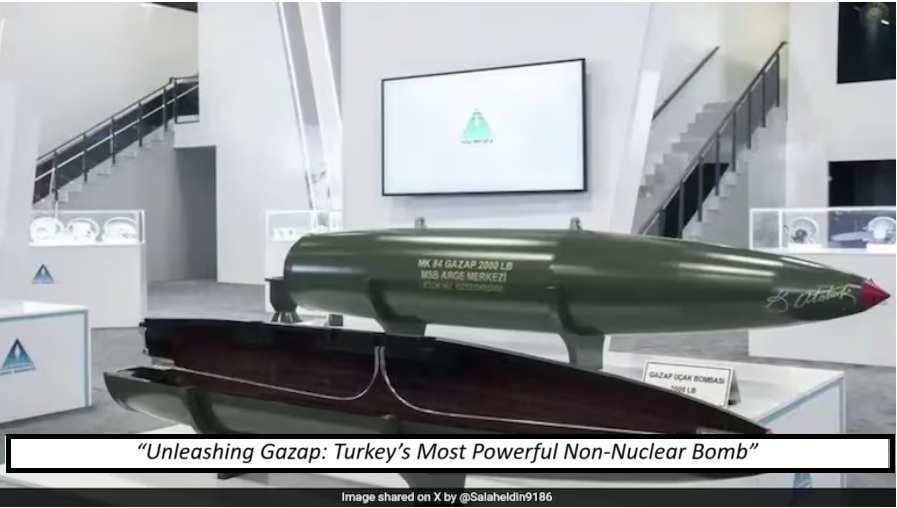Gazap bomb disperses 10.16 fragments per square meter, making it 3x deadlier than traditional MK-series weapons.
Turkey has revealed two new state-of-the-art aircraft bombs—Gazap (Wrath) and Hayalet (Ghost)—at the 17th International Defence Industry Fair. Developed by the country’s Ministry of National Defence R&D Centre, these weapons showcase major advancements in Turkey’s military technology, positioning it among the world’s leaders in conventional firepower.
💣 Gazap Bomb: A New Benchmark in Non-Nuclear Power
- Weight: 970 kg (2,000 pounds)
- Type: High-fragmentation aircraft bomb
- Dispersal Capability: 10.16 fragments per square meter
- Fragmentation Radius: Up to 1 km
- Deployment Platforms: Turkish F-16 and F-4 fighter jets (drone compatibility planned)
Key Features:
- Based on the MK-84 bomb design but enhanced with a fragment-based structure using over 10,000 controlled particles.
- Three times more destructive than standard MK-series bombs.
- Fragmentation pattern mimics defensive grenades, reducing random shrapnel and increasing lethal precision.
- Improved internal ribbing and modified filler enhance the overall blast and penetration effect.
💬 “Gazap disperses 10.16 fragments per square meter, making it three times more powerful than standard MK-series bombs,” said R&D Director Nilufer Kuzulu.
🛡️ Hayalet Bomb: Advanced Bunker Buster
- Penetration Power: Up to 90 meters through rock and soil
- Concrete Penetration: 7 meters of reinforced C50-grade concrete
- Tested On: Ribbed steel, sand pools, multi-layered bunkers
Key Features:
- Designed to destroy hardened infrastructure including bunkers, nuclear facilities, and fortified command centers.
- Surpasses the standard bomb penetration of 1.8–2.4 meters in reinforced concrete.
- Successfully pierced steel cages, sand barriers, and concrete blocks during tests, traveling up to 600 meters post-impact.
- Compatible with F-16 aircraft and smart munition kits for precision targeting.
💬 “The island we tested on was 160 meters wide. The impact was detected across its full width,” Kuzulu noted.
🌍 Geopolitical Implications: India Watches Turkey-Pakistan Ties Closely
Turkey’s growing defence collaboration with Pakistan has raised security concerns for India, particularly in light of ongoing tensions. While Ankara and Islamabad deny arms transfers, reports have confirmed the use of Turkish Bayraktar TB2 drones by Pakistan in recent operations near Indian borders.
Turkey also voiced support for Pakistan during its military standoff with India in May, reinforcing its role as a key strategic ally in South Asia.
🧠 Key Takeaways for Strategic Analysts
- Gazap positions Turkey among the few nations with ultra-high-fragmentation, non-nuclear bombs.
- Hayalet offers new depth in bunker-busting warfare, with superior penetration and targeting systems.
- Their development aligns with Turkey’s broader strategy of self-reliance in defence tech and its expanding role within NATO.
- India’s defence establishment may need to reassess regional strategic partnerships and military preparedness.
Also Read : India Successfully Test-Fires Drone-Launched Missile: Major Leap in Defence Technology



